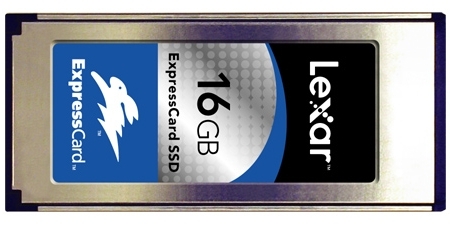
Lexar recently unveiled its ExpressCard SSD line, a collection of solid state drives that come in 4GB, 8GB and 16GB flavors. I’ve had the opportunity to test one of the 8GB models extensively over the past couple of weeks and I’m now prepared to deliver my thoughts. Does it deliver?
In short, no. Although the drive itself is Mac compatible, it is designed for PC use. All of its software is PC only, so its auto-backup function does nothing on Mac.
The drive is optimized for Windows Vista. Specifically for its ReadyBoost function. ReadyBoost allows users to enhance system performance by fast caching data directly to the ExpressCard SSD. The problem is that the card is interpolated through USB 2.0 rather than PCI Express, which means the SSD accesses at just 480Mbps rather than the 2.5Gbps supported through PCI-E.
Consider also that the DDR2 memory typically used in systems transfers at least 3.2GBps and that SATA hard drives have throughputs of 1.5Gbps and 3Gbps. The numbers show that ReadyBoost is only truly valid with PCI-E based ExpressCards.
As far as extra storage goes, it’s an acceptable solution. I achieved access speeds that were exactly on par with my USB 2.0 flash drives — it wrote at about 4MBps and read at about 13MBps. That said, I can’t see any that someone would purchase this over, say, any other flash drive on the market.
It consumes your ExpressCard slot and provides no performance gain whatsoever. So until a PCI-E version exists, stick with the thumb drives. This technology hasn’t come ’round yet.